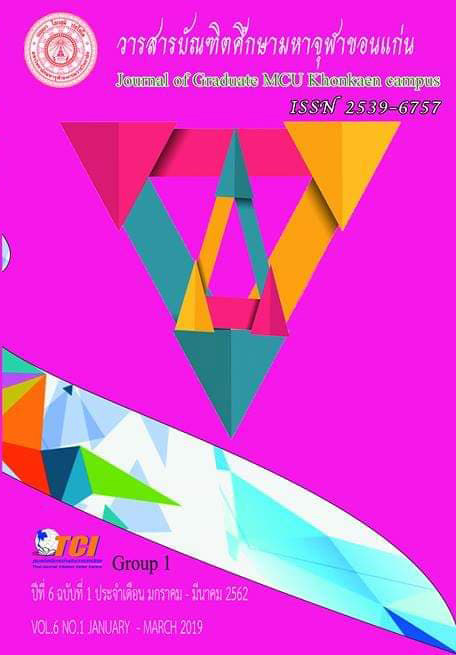Promotion of the Process of Right Life Lihood of the Community Enterprise in Phichit
Main Article Content
Abstract
The objectives of the research "Promote the Process of the Righteous Among Community Enterprises in Phichit Province" were: 1) to study the process of the right livelihooh the community enterprise. 2) to analyze the principles of Buddhism and community enterprise development in Phichit province and 3) to promote the process the right livelihooh the community enterprise in Phichit province. It was the mixed method research: quantilalive and qaulitive.
The population of this research was a total of the community outerprisr in jurislic or ordinary in Phichit. Community Enterprise / Network Currently, there are 372 community enterprises, one enterprise network, 6,367 members and the research samples were selected with the multistage sampling method Part 1: General data of population and questionnaires Questionnaires were asked by community stakeholders. For general inquiries Part 2: Indepth Interview is a structured interview, which provide important information to stakeholders. It was acquired by the Purposive Sampling of leaders, members, producers, community producers. Community Enterprise In the district where the award for community enterprise outstanding. Provincial level during the year Group 3, group discussion, focus groups, selective focus groups (Purposive Sampling) From the administrators, government officials, 11 people / person
The research finding were are follows:
1. The process of right livelihooh the community enterprise in Phichit province. Findings of the sample. The way to promote the process of the workers of the community enterprise in Phichit province is the process of the public. It was found that the promotion of the process of the good of the community enterprise in Phichit province. In the process of good conduct, the overall level was high (x̄ = 3.78, S.D. = 0.79). The main processes of community enterprises in Phichit province, the principles of Buddhism and the development of community enterprises were found a high level (x̄ = 3.65, S.D. = 1.02). It was found that the process of good practice of community enterprises in Phichit province, the principles of Buddhism and the development of community enterprises were found a good level ( x̄ = 3.67, S.D. = 0.77).
2. The principle of religion in support of religion. Promote the righteous And facilitates the development of community enterprises in Phichit Province. 1.) Principles that support the righteousness consists of A) The Noble Eightfold Path B) The four have the virtues. 4. 2.) The principles that promote the righteousness consistd of three. 4. Four objects. 3) Bhogavibhāga 4 3) The virtues for the family. 4 secrets of secular life. Group of Community Enterprises in Phichit Province
3. How to Promote the Process of Criminals Group of Community Enterprises in Phichit Province The government agencies should help and encourage the farmers to join the group and the community network. 1) Production process participation Management and marketing. 2) Principles in Buddhism to develop community enterprises in the province. 3) Promote integrated learning process with partner organizations to develop community learning resources.
Article Details
References
Online. RetrievedAugust 22, 2017. from: http://www.sceb.doae.go.
th/Documents/STC/cebest56mini.pdf
Department of Religious Affairs. (2007). Summary Master Plan for Promoting
National Merit No. 1 .(2007 – 2012). Bangkok: Ministry of Culture.
Kasem Junkaew. (2002). Integrated Environmental Management. Bangkok:
Kasetsart University.
Mariam Ninpan. (2012). Education Research Methodology. (6thed.). Nakhon
Pathom: Silpakorn University.
Office of the National Economics and Social Development Board. (2012).
THE Eleventh Plan No. 11 (2012 - 2016). Online. Retrieved Mach
1, 2012. from: http:// www.nesdb.go.th/Default.axpx? tabid395
Phratepvethe. (2000). Sustainable Development. (7th ed.). Bangkok: Komol
Foundation.
Pinij Ngamrungroj. (2006). Principle of Community Development.
(Mimeographed).
Prawas Wasi. (2016). Reform Direction Must Revolutionize Consciousness.
Online. Retrieved August 2, 2017. from: http://www.thansettakij.
com/content/87784
Sunai Junlapongsatorn. (2006). Cultural Change and The Concept of
Community Economy for Sustainable Choice. Research Report.
College: Maejo University.

